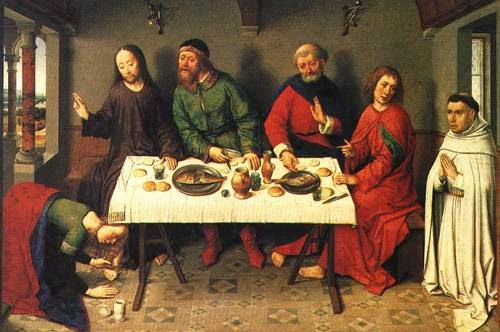Thinking About Grace...Part 10
And so Jesus was invited to dinner by a respected member of the community. He was someone everyone looked up to, and those "in the know" knew Jesus should be honored to be invited to such an important dinner. It was a sign that Jesus was being accepted by the important people. They wanted to rub shoulders with him, be seen with him, maybe even have their picture taken with him.
Jesus went, along with his disciples, to the dinner, and the food was magnificent. The best of the best. Certainly better than most of what they had been eating as they traveled from here to there. The disciples were in heaven. Most of them were "common folk," and never dreamed they'd be invited to a fancy, formal dinner like this.
Then, in the midst of the conversation, a woman slipped through the open door. She quietly walked up behind Jesus, knelt down at his feet, and began crying. She had hoped not to make a scene, but one by one, those at the dinner noticed her and stopped talking. They stared. They knew what kind of woman she was. She was a sinner. She had a reputation. She was one of "them."
Simon, the host of the dinner, a very religious person, whispered to the one sitting next to him, "If Jesus knew what kind of woman that is, he would never let her touch him!"
Ungrace.
Meanwhile, the woman cried, and, realizing her tears were dropping on Jesus' feet, she began to wipe his feet off with her tears.
Simon certainly hadn't intended anyone—least of all Jesus—to hear his snide comment, and he would never be sure if anyone had, but Jesus did speak up right after that. "Simon," he said over the woman's tears, "I have something to tell you."
Simon smiled. It was an honor to have such focused attention from a rabbi. "Tell me, teacher," he said.
"Two men owed a moneylender large amounts of money. One owed a million dollars, the other owed ten thousand dollars. The amount didn't really matter, though, because neither of them could afford to pay. So the moneylender, who had had a good year, forgave the debts of both." Jesus paused, glanced over at the woman who seemed now to have her tears somewhat under control, then continued. "Which of these men do you suppose will love the moneylender more?"
Simon shifted uncomfortably. He himself had just paid off a debt he had owed for a long time. "Well, teacher, I suppose the one who owed him more."
Jesus nodded, then turned to look at the woman. "Do you see this woman, Simon? Do you see her? You didn't make sure my feet were washed when I came in, as is the custom, but she has washed my feet with her tears. You offered me little hospitality, yet she hasn't stopped caring for me since she walked in. Others may be worried about her sin, but I tell you, her sins are forgiven."
Grace.
Then Jesus turned to Simon. "The one who is forgiven little loves little." Then he turned back to the woman and announced, "Your sins are forgiven."
This time, it was others who grumbled. "Who is this who thinks he can forgive sins?"
He's the Son of God, that's who. He is the only one who can really forgive sins. He is the only one who can judge sins. Simon isn't qualified, and neither are we. Only Jesus can and he is the source of all grace, mercy, peace and love. And if he is the source of grace, where, then, do we suppose ungrace comes from?
(See Luke 7 for the whole story.)



Comments
Post a Comment